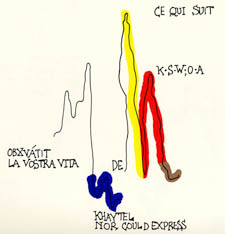Long notes are more important than short notes. Pianists often get confused. Because we don’t hold out long-duration tones with bow or breath, it’s easy to underestimate their significance.
Virtuoso pianists spend so much time attending to what’s difficult in virtuoso pieces that it can seem these difficulties — often passages of short, quick notes — really are the most important thing in a piece of music. Frequently, it’s the other way around. Frequently, all those fast notes matter least. It’s the long tones that convey “meaning” and emotion. It’s with long tones that poignant dissonance is stressed. Long tones are where the important syllables of the important words would fall — if there were any words …
 Some Instrumentalists like to make fun of singers. Singers can’t “count,” singers have an imprecise command of rhythm, so the jokes go. But the kind of singing (or speaking) in which the long sounds of critical words in a text are strongly produced and held, and the relatively unimportant quicker syllables are not over-pondered, the sort of vocalizing that may even linger when something is disturbing, or hard-to-follow, and then rush ahead with easy little linking-words on the tongue — that kind of singing has everything we players of instruments might want.
Some Instrumentalists like to make fun of singers. Singers can’t “count,” singers have an imprecise command of rhythm, so the jokes go. But the kind of singing (or speaking) in which the long sounds of critical words in a text are strongly produced and held, and the relatively unimportant quicker syllables are not over-pondered, the sort of vocalizing that may even linger when something is disturbing, or hard-to-follow, and then rush ahead with easy little linking-words on the tongue — that kind of singing has everything we players of instruments might want.
Let’s not learn how to count, but how to deliver.

Don’t you think that the duality between longer or shorter notes can lead to path not further than just longer or shorter notes. I think it might be expressing better what you think if the distinction of how “important” (and also tied to its “frequency”) could be less fixed on the words as I tend to read…
lovely observation, bruce; it rings true in every way. hope all is well
GF, you are anticipating a post I had planned concerning better representation for notes of “intermediate duration”! It is true that distinctions like “long” or “short” are awfully simple.
Yes, but i would step even a bit further and reflect about the distinctions themselves. I will see later what you mean with intermediate duration, but what you mentioned as awfully simple is not quite. Short notes are just short notes, long just long (an even intermediate, intermediate). Try to put a hierarchical apparatus to them seems awfully intrusive as things are what they are. That’s an infinite possibility that i often ponder…
Perhaps because I see myself more as a composer than a performer, I might “argue” for slightly better words here. I wouldn’t say that long notes are “more important” than shorter ones – rather, they are “just as important” as shorter ones. The expressivity of long notes is timbrally dependent. No matter how I try, there is no way I can get a piano to crescendo on a double whole note when quarter = anything. A performer needs to be conscientious about the overall performative energy a piece demands – whether it is the opening of the Rachmaninoff 2nd piano concerto or Curran’s Hope St. Tunnel Blues. They are pieces with expressive potency because of their rhythmic identities. The temporal arc is just one of many that a composer (likewise the performer and listener) that needs attention.
So true. And it is funny, because I am always telling my students that, even at the piano, their arms are like the bows of a string instrument, or use the arms as though you are a string player, or of a conductor. For pianists, it is the speed of the approach to the keys and the speed of the key to the bottom of the keybed that also determines the duration of the long note(s). When they understand this concept, their manner of producing sound is forever altered. Virtuosity is nice, but is sometimes a hindrance for those who have ease and facility, to take the time to produce the best possible sound–be it slow or fast.